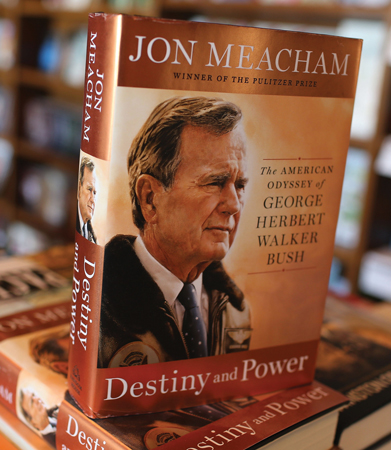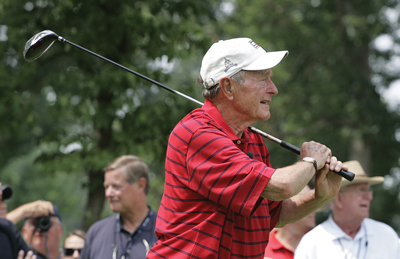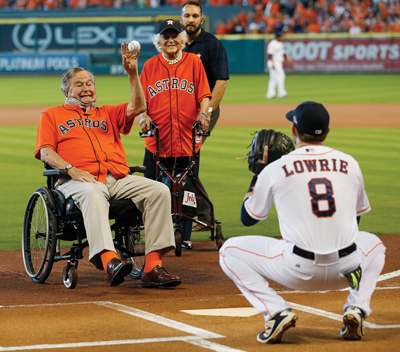Plenty of presidents have brought a love of sports to the White House, but few can match George Herbert Walker Bush. The man who came to be known as, simply, “41,” now uses a wheelchair, but he went skydiving as recently as two years ago to celebrate his 90th birthday.
During his presidency from 1989 to 1993, Americans became familiar with Bush’s interest, and participation, in sports. He raced his speedboat on trips to the family retreat in Kennebunkport, Maine, and indulged his love of speed-golf whenever time permitted.
 |
| Photo by: GETTY IMAGES |
And his fandom remains intact, too. In October, Bush, a longtime Houston Astros fan, threw out the first pitch at Minute Maid Park before a playoff game. Months earlier, he chatted with Dallas Cowboys coach Jason Garrett and quarterback Tony Romo while watching an NCAA tournament game.
Bush 41 is back in the spotlight thanks to a new biography written by Jon Meacham. The book, “Destiny and Power: The American Odyssey of George Herbert Walker Bush,” debuted at No. 1 on The New York Times nonfiction best-seller list in November.
Meacham, 46, wrote for Newsweek and edited the magazine from 2006 through 2010. Along the way, he became a leading presidential historian. His books include an account of the friendship between Franklin Roosevelt and Winston Churchill and biographies of Thomas Jefferson and Andrew Jackson. The latter, “American Lion,” won the Pulitzer Prize in 2009.
He spoke to correspondent Erik Spanberg about George H.W. Bush’s sports passions and the larger legacy of POTUSes past and present playing and watching games. Here are excerpts from that conversation.
■ On how sports influenced Bush: Sports was the air he breathed all of his life. He was an early soccer player at Greenwich Country Day School, he played baseball and soccer for Andover, [was] captain of the baseball team at Yale, went to the first two College World Series [with Yale]. One year they played USC and one year they played [California] and they lost both.
For him, athletics was both an escape and a metaphor, if you will. They were an escape from the day-to-day work of politics and of life. But they also were a metaphor for life. He believed — with the Victorians — that athletic success and athletic effort was of a piece with success and effort in life. So, if you follow his life all the way through, and whether it’s tennis or golf, horseshoes or, now, skydiving, he always took the vigorous life seriously.
■ On 41’s father, U.S. Sen. Prescott Bush of Connecticut: Prescott Bush was [President Eisenhower’s] favorite golfer in the Senate, partly because he was really good and partly because he would never talk about whatever they talked about on the course. There was no leaking from Prescott Bush.
 |
From golf and tennis, to throwing out the first pitch, George Herbert Walker Bush has taken a vigorous approach to sports.
Photos by: GETTY IMAGES
|
If you know about Prescott Bush, you know he was head of the USGA. This came from both sides of Bush’s family. The Walker Cup, obviously. G.H. Walker [father of Dorothy Walker, George H.W. Bush’s mother] was a significant golf figure.
And I have that scene early in the book of Samuel P. Bush [Prescott Bush’s father] hitting a golf ball off the top of the Hotel Traymore in Atlantic City [in 1915]. Everyone was an excellent golfer, everyone
played tennis, everyone played some team sports, as well. Life was suffused with sports.
■ On the continued legacy of presidents and sports: I think we all see life as competition. There is something almost therapeutic about being able to follow competition when it doesn’t directly affect our station in life. So it’s a diversion but it’s not a diversion because it’s totally different from life. It’s a diversion because it mirrors life, I think. There’s something in all of us that wants to see someone win and someone lose.
For presidents, the ability to follow that kind of contest without having one’s own skin in the game, so to speak, is, I suspect, therapeutic.
■ On what leaves a bigger impression, presidents playing or presidents watching others play: What they do themselves is more revealing because that means they’re putting themselves on the line.
Remember, presidents aren’t accustomed to being second at anything. So if they put themselves on a basketball court, like Obama, or on the golf course, like Bush or Ford or Eisenhower, you’re putting something at risk. What’s interesting is the presidency is such an intrinsically risky operation, whenever they play a competitive sport, it’s almost elective stress in a job that has plenty of it already.
■ On whether occasions such as Obama’s ESPN March Madness brackets and George W. Bush’s 2001 World Series pitch are more image-building or personal choice: In the presidency, you can’t really separate symbolism from substance. They’re all intertwined together. There’s never an off-stage moment for a president. And so everything, whether it’s throwing out a first pitch and wanting to throw a strike or playing horseshoes with [Mikhail] Gorbachev, as George H.W. Bush did … it drove George Bush crazy that Gorbachev threw a ringer on his first try. He had the horseshoe mounted, framed and sent it to Gorbachev.
■ On sports revealing character, such as Don Van Natta Jr.’s account of Bill Clinton’s numerous mulligans (“Billigans”) in “First Off the Tee”: The Bushes are very strict rule-abiders on the golf course and on the tennis court. I think it is revealing. And I think the fact that President Clinton likes to have a lot of do-overs tells us a lot about his character. I think the fact that the Bushes are very precise and follow the rules to a T tells us a lot about them.
■ On talking sports with 41: [It came up] a good bit. I remember once, something had just happened to Nolan Ryan. And [Bush] said, “Oh, I’ve got to call Nolan later today.”
I played golf with [41] once, years ago, in Kennebunkport. Occasionally, we would have to talk about how the Astros were doing. He was very proud of the fact that his uncle Herbie, Herbert Walker, had owned the Mets. There’s the whole W thing, too [with 41’s son, President George W. Bush, once owning the Texas Rangers].
■ On playing golf with 41: It was terrifying because there were Secret Service guys around. So there are armed men watching. And I don’t need more anxiety playing golf.
It was not my finest round, but it was the most fun I ever had on the course. He was very serious-minded about it. He must have been in his 80s. He was quite good. If you hit a good shot, he’d say, “Great golf shot.” That was his phrase. He didn’t say it much to me that day.
I was a disaster, but it was memorable.
Erik Spanberg writes for the Charlotte Business Journal, an affiliated publication.







